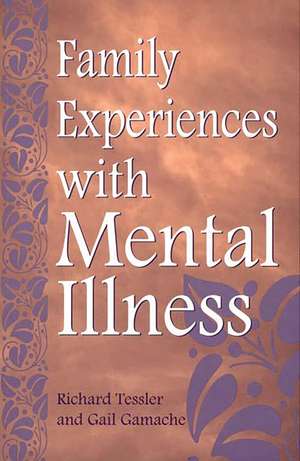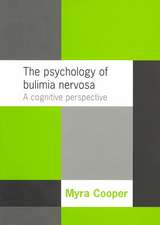Family Experiences with Mental Illness
Autor Gail Gamache, Richard Tessleren Limba Engleză Paperback – 29 mar 2000 – vârsta până la 17 ani
| Toate formatele și edițiile | Preț | Express |
|---|---|---|
| Paperback (1) | 230.43 lei 43-57 zile | |
| Bloomsbury Publishing – 29 mar 2000 | 230.43 lei 43-57 zile | |
| Hardback (1) | 437.75 lei 43-57 zile | |
| Bloomsbury Publishing – 29 mar 2000 | 437.75 lei 43-57 zile |
Preț: 230.43 lei
Preț vechi: 296.90 lei
-22% Nou
Puncte Express: 346
Preț estimativ în valută:
44.09€ • 46.16$ • 36.48£
44.09€ • 46.16$ • 36.48£
Carte tipărită la comandă
Livrare economică 07-21 aprilie
Preluare comenzi: 021 569.72.76
Specificații
ISBN-13: 9780865692527
ISBN-10: 0865692521
Pagini: 208
Dimensiuni: 156 x 235 x 15 mm
Greutate: 0.33 kg
Editura: Bloomsbury Publishing
Colecția Praeger
Locul publicării:New York, United States
ISBN-10: 0865692521
Pagini: 208
Dimensiuni: 156 x 235 x 15 mm
Greutate: 0.33 kg
Editura: Bloomsbury Publishing
Colecția Praeger
Locul publicării:New York, United States
Notă biografică
RICHARD TESSLER is Professor of Sociology and Associate Director of the University of Massachusetts' Social and Demographic Research Institute. He is the senior author of The Chronically Mentally Ill: Assessing Community Support Programs and West Meets East: Americans Adopt Chinese Children (Bergin & Garvey, 1999).GAIL GAMACHE is an Adjunct Assistant Professor and Senior Postdoctoral Research Associate at the University of Massachusetts. She has published numerous articles with Richard Tessler, and they recently co-authored, with Liming Liu, West Meets East: Americans Adopt Chinese Children (Bergin & Garvey, 1999).
Cuprins
PrefaceIntroductionMental Illness and the FamilyFamily Experiences in Ohio: 1989-1992The Research LandscapeWhat Basic Needs Did Family Members Provide?What Troublesome Behaviors Did Family Members Try to Control?How Much Did Family Members Spend?What Were the Emotional Costs for Family Members?What Were the Positive Aspects for Family Members?How Involved Were Other Members of the Family Household?Family Experiences in Ohio: 1995-1997The Research Landscape RevisitedHow Much Involvement Do Family Members Want?How Did Family Members Evaluate Professionals, Services, and Systems?What Did Family Members Know about Mental Health Insurance?ImplicationsDilemmas of KinshipBibliographyIndex




















